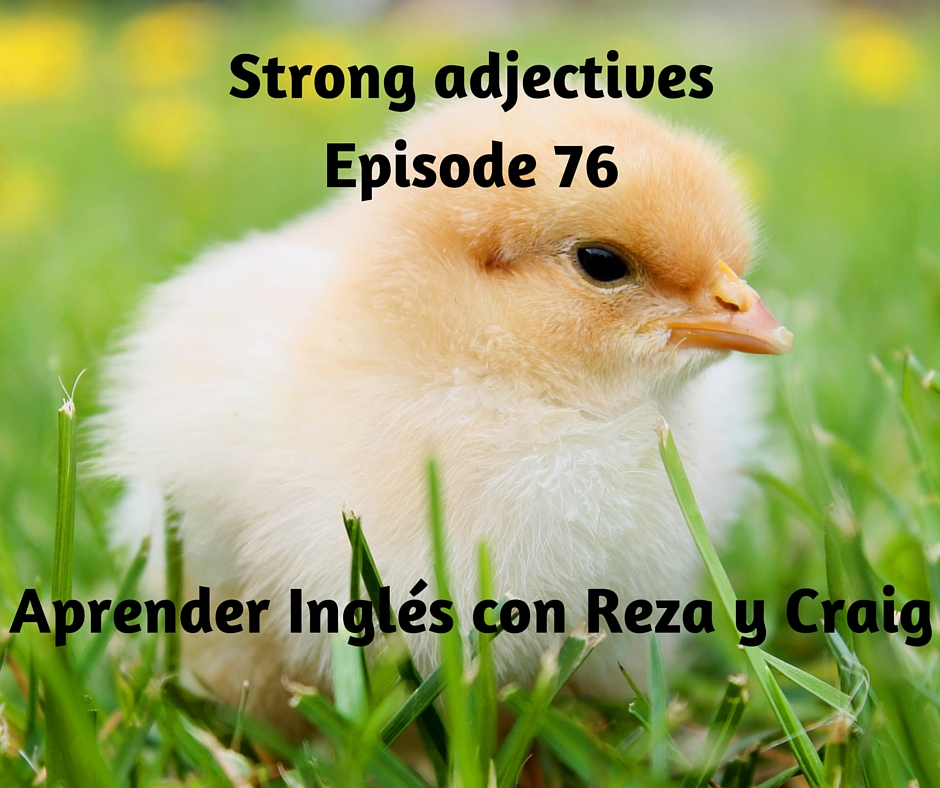
If you are a new listener to this podcast, welcome! We are going to help you grow your grammar, vocalize your vocabulary and perfect your pronunciation.
With over 40 years of teaching between us, we’ll help you improve your English and take it to the next level.
In this episode: Strong (extreme) adjectives: big – huge, enormous / angry – furious etc.
Listener Feedback:
Hello Craig, I’m Rafael (again), I have heard (I heard) in your last episode, that one listener ask for the Spanish expression “tira y afloja” this expressión is very common in Spanish, and there is always a negotiation on (there’s always debate about it)….I’ll explain you in a example (I’ll explain it to you in an example). When Russia and USA, se reunen para negociar algo, Russia cede en algo a favor de los Estados Unidos y Estados Unidos cede en otra cosa a favor de Rusia, cuando esa negociación es dura, entonces hablamos de un “tira y afloja” (uno cede en algo a favor del otro y el otro cede en algo en favor de uno).…don’t confuse with the expression (very similar) “rifirrafe” is the same but more hard (heavy) example: two players in a macht of football (football match), se están dando “leña” (not fair play, but the contrary), se dan “pataditas”durante todo el encuentro o se llegan a insultar (por ejemplo) entonces decimos que ha habido un “rifirrafe” entre dos jugadores….
rifirrafe = altercation, rough stuff, squabble. argy bargy
a needle match (needle = aguja)
I looked for the phrasal verb “trade off” and it is not the same, in Spanish it would be “compensación” as you have well explained in the episode.
Another thing, tell Reza that ‘el día de la Hispanidad’… He made a good translation as Spanishness (I looked in the dictionary) and also Colombus day (as you have well said in the episode)
Bueno esto es todo, espero no haberme puesto muy pesado, (y si me pongo), no tienes mas que decirmelo. (que dejaré de serlo)
Thanks a lot
Rafael Alba Garcia
Our English courses are free at mansioningles.com
You can get private lessons with a personal teacher at italki
Strong (extreme) adjectives
Angry – furious
Big – huge, enormous, vast, titanic, colossal
Clever – brilliant, ingenious
Cold – freezing
Dirty – filthy, stinking, grotty (cutre)
Hot – boiling, roasting, baking hot
Hungry – starving, famished
Interested – fascinated
Pleased – ecstatic, thrilled, delighted
Surprised – Shocked – horrified
Scared – frightened-petrified/terrified
Small – tiny, miniscule
Surprised – amazed, astonished, shocked
Tired – exhausted (knackered – British English colloquial slang)
Ugly – hideous
Upset – devastated
PROVERBS – What is a proverb? – A simple and concrete saying, popularly known and repeated, that expresses a truth based on common sense or the practical experience of humanity. Proverbs are often metaphorical (metaphor – metáfora).
“You can lead a horse to water, but you can’t make it drink”
“Don’t count your chickens before they hatch.”
“The grass is always greener on the other side of the fence.”
“You can’t judge a book by its cover.”
“Absence makes the heart grow fonder.”
“Out of sight, out of mind.”
…and now it’s your turn to practise your English. Send us a voice message with your favourite proverb or saying to [email protected] or [email protected], or send us a voice message using speakpipe.
Join us on Blab and practise your speaking for free: www.inglespodcast.com/blab/
On next week’s episode: Starting a conversation and making small talk.
The music in this podcast is by Pitx. The track is called ‘See You Later’


